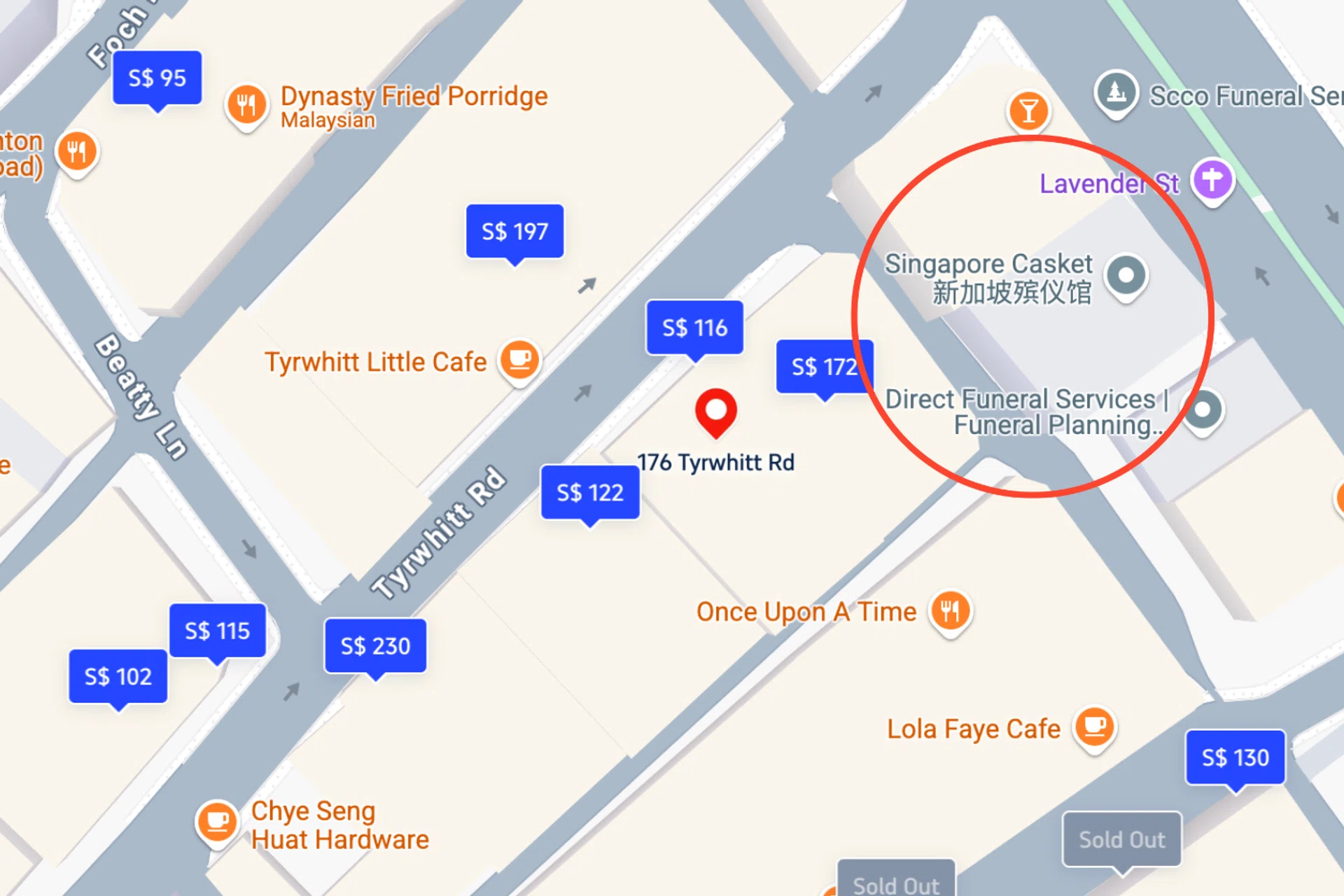Sleeping next to the dead? Some tourists don't mind Lavender's funeral home neighbours
The historic district has heritage charm and is well-connected to the transport system.
Fancy spending the night near a funeral home? Lavender might be just the place for you - even if not everyone relishes the prospect.
A Taiwanese tourist who brought her two young daughters to Singapore in early July had a nasty surprise when she discovered that the hotel she booked was located beside well-known funeral service provider Singapore Casket.
"As a tourist who is unfamiliar with the local surroundings, I felt deeply uncomfortable and misled," Shannon, who was unsuccessful in her attempt to get a refund, told Stomp.
Neither the booking platform nor the website for Arton Boutique Hotel had mentioned its proximity to the funeral home, she added. "How can hotels in Singapore be allowed to hide such important location information?"

But the hotel that Shannon booked is far from the exception - a search on hotel booking platform Trip.com listed at least nine hotels in the surrounding area of Singapore Casket.
In addition, the storefront of Direct Funeral Services, offering funeral service packages, is located next to the Singapore Casket building.
There are at least four funeral homes and service providers in the Lavender area, alongside temples, coffee shops, and other commercial buildings.
But not all may be aware of its storied history, or that Lavender was not always known for funeral homes.

Not-so-fragrant history
Despite its fragrant name, Lavender used to be occupied by Chinese vegetable gardens fertilised with nightsoil and a gasworks plant releasing strong-smelling gases.
According to The Urbanist Singapore founder Ho Yong Min, residents proposed the name "lavender" ironically, and the municipality officially accepted it in 1858.
"It was associated with working-class trades, clan associations, and community schools. Over time, the neighbourhood grew into a mixed-use zone - part industrial, part residential, and part religious or communal," the 41-year-old heritage educator told TNP.
Mr Ho reckoned that the presence of funeral parlours in Lavender today is more likely related to zoning regulations, commercial leasing, and availability of space. "These businesses are typically allowed in commercial or institutional zones, and Lavender's mixed-use landscape makes it a feasible location."
The area's mixed-use character and central location have attracted hoteliers as it is a "sweet spot" with easy access to public transportation, heritage charm, and slightly lower operational costs, he added.
Do you mind?
A convenience store employee said that while there were many tourists in the area, not many knew about the nearby funeral parlours.
The presence of funeral homes near their hotel indeed came as a shock to two Chinese nationals who had booked a room at Hotel Yan, a two-minute walk from Singapore Casket.
The two women in their 20s, who declined to give their names, told TNP that they were not aware of the presence of a funeral home when they made the booking online.
"In China, such things will not be located in an obvious space," one of the women said in Mandarin.
However, other tourists did not mind the location.
A 25-year-old Indonesian who only wanted to be known as Ms Katut has been visiting Singapore for the past three years to see her sister. It was her first time staying in Lavender.
While she admitted that Indonesians are superstitious, she was not disturbed by the nearby funeral parlours, and was not even aware of their presence.
A woman in her 20s from the Philippines, who declined to give her name, was staying with her family of three at a hotel in Orchard but had gone to a coin laundry along Tyrwhitt Road.
She told TNP that back home, there is no aversion to places associated with death, and the family had no problems with staying nearby. "In the Philippines, there are hotels near cemeteries, so it's just fine," she said.
'Closely integrated with everyday life'
Mr Ho of The Urbanist Singapore shared that historically, places linked to death were often closely integrated with everyday life.
He cited Sago Lane in Chinatown as an example, where the "street of the dead" was home to funeral parlours, coffin shops, and shophouses that housed the terminally ill.
"Rather than being hidden away, these services were visible and embedded in the community fabric."
Today, Mr Ho noted, Singapore's urban planning framework is governed by clear zoning laws, public health standards, and land use controls. Funeral parlours are thus subject to many more planning considerations.
Muhammad Fariz Daud, a 22-year-old student visiting from Malaysia, told TNP he would have no problem with staying at a hotel beside a funeral home. Nevertheless, most Malaysians would avoid hotels near cemeteries, which are considered more taboo.
But Mr Fariz added that he will do research on the hotel's location and public transport connectivity before making a booking.
"It's not really the hotel's fault for not informing the customers that there's a funeral home nearby - you can do that research yourself."